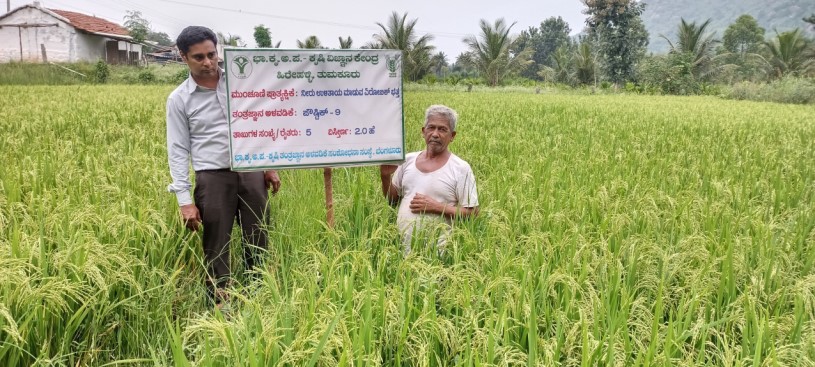
Water saving Aerobic Paddy Paustic-9 to combat climate vulnerability

Background
Rice (Oryza sativa L.) is the most important cereal crop of India. In Karnataka, about 55–60% of the rice is grown under puddled system and the rest is under a rainfed situation. Traditional rice cultivation method is well-suited to countries and regions with low labour cost and high rainfall, as it is very labour intensive. Irrigated rice is typically transplanted into puddled paddy fields, which includes land preparation with 4-6 inches of standing water and this method of cultivation requires large quantities of water and is labour intensive. It is well known that the rice grown under wetland conditions contribute to the bulk of the rice production but consumes huge amount of water and labour. To keep up the rice production during irrigation water shortage, alternate methods of cultivation of rice is essential. One such strategy is cultivation of rice under aerobic situation. Aerobic rice is a promising rice cultivation system for managing water and growing rice under water-limited conditions, reduce water losses and increasing water productivity. Aerobic rice usually grown in upland conditions in unpuddled soil with nonflooded conditions, i.e., unsaturated (aerobic) soil with less water requirement
Interventions
New Aerobic Paddy variety Paustic-9 was released in 2019 at University of Agricultural Science, Bengaluru for South Eastern Dry Zone of Karnataka. The main advantages of the drought tolerant Aerobic Paddy of Paustic-9 are profuse root system, plant stand and vigor and tolerance to water stress at both vegetative and reproductive stages. It is known for maturity in 115-120 days, medium duration, direct sowing, no need for puddling, improving soil structure, reduction in pollution, more tillering per seed and 50-60% water saving along with 80% seeds saving and reduction in 30% labour cost. Because of increasing water scarcity, cultivation of Aerobic Paddy variety Paustic-9 was promoted and demonstrated in the villages which have water scarcity.
ICAR- Krishi Vigyan Kendra, Hirehalli, Tumakuru had conducted demonstration of Aerobic Paddy Paustic-9 in D.Nagenahalli and Tanganahalli villages of Koratagere Taluk and Karemadanahalli, Sira Taluk of Tumakuru District. The farmers were selected randomly and provided with 3 kg of Pausstic-9 seeds for aerobic cultivation in 4 ha during 2019 to 2021. Combating the climate vulnerability like intermittent dry spells, the Paustic-9 variety has shown resilience and improved yields.
Output and outcome
The results, as shown in below table, showed an increase in Paustic-9 yield 26.21% over the yield of local Paddy variety (Doddi) and an increase in additional income up to 48 %.
Comparison of yield parameters of Aerobic Paddy Paustic-9 and Local Paddy variety
| Details of results obtained due to the adoption of technologies | Improved technology
Aerobic Paddy (Paustic-9) | Traditional practices
Local Paddy (Doddi) |
| Productivity per hectare (q/ha) | 31.30 | 24.80 |
| Percent increase in productivity per hectare |
26.21 | |
| Cost of production per hectare (Rs.) | 21,750 | 20,250 |
| Gross income per hectare (Rs.) | 46,950 | 37,200 |
| Net income per hectare (Rs.) | 25,200 | 16,950 |
| Percent increase in net income per hectare | 48.67% | |
Impact
The performance of Aerobic Paddy Paustic-9 variety was superior in grain yield over local Paddy (Doddi). The farmers harvested an average grain yield of 31.3 q/ha with an yield advantage of 26.21% over the existing variety. Almost all farmers expressed water saving character of this variety during crop growth period. The water saving was also found to be at about 48.67%. In Aerobic Rice fields, as the soil is maintained under aerobic condion for the enre crop cycle, the methane production is nil or minimal. As laborer stand in puddled fields, for long hours, days on end, the damage caused to their feet is immense.The cuts and bruises due to sensivity to long me exposure to water, and infectons thereof, causes ill healthto labor. In aerobic condion all these issues are eliminated, as there is no standing water in the field. Thishas long term health benefits to the farm laborers, farming community and the country.
